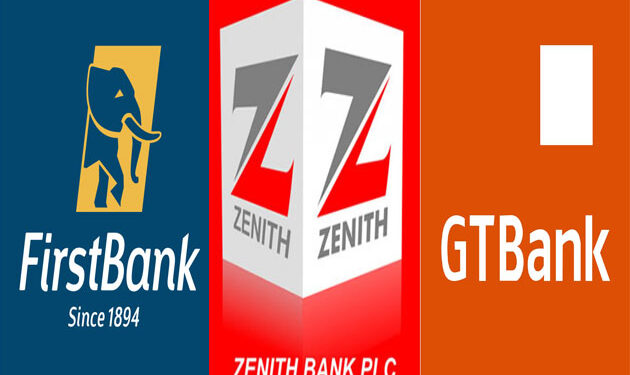* First bank, GTBank, Zenith, Others May Be Affected
John Danjuma Omachonu
Despite windfall profits declared by some Nigerian banks, ocassioned by poor exchange rate of the naira against other international currencies like the dollar, particularly in the current financial year, the net interest margins may shrink, moving forward, following attractive interest on Federal Government savings bond targeted at retail investors.
Already the banks are reeling under an operating environment characterised by pressure on the naira, limited access to foreign currency and policy uncertainty, among others.
But some of the lenders, particularly, those with offshore subsidiaries who are experiencing bumper harvest, when the foreign currency earnings are converted to local currency of the country of operating origin may not find it rosy as time goes on as the attractive bond may reduce their patronage.
The Nigerian debt management office (DMO) had about seven years ago introduced a new two-year savings bond targeted at the retail investor with yields on offer as high as 13 percent and minimum subscription levels of N5, 000.
Specifically, the Federal Government, this week opened the sale of its Savings Bond to retail investors with the promise of a higher return than last month’s auction as an interest rate adjustment in the economy of Africa’s largest exporter of crude gathers momentum.
The government will sell a two-year savings bond at 12.46 percent per annum, 139 basis points higher than the 11.07 percent it went for in October while the three year bond will be sold at 13.46 percent, also higher than the 12.07 percent it sold for last month.
According to the DMO,the minimum amount that can be invested in the Savings Bond is N5,000 while a maximum of N50 million can be invested.
The offer opened Monday November 6 and the closing date is November 10 while settlement date is November 15, 2023.
The interest payment will be paid quarterly with coupon payment dates on February 15, May 15, August 15 and November 15.
Some analysts who spoke to metrobusinessnews.com (MBN) say the bond could pose a challenge for deposit money banks (DMB)’s net profit margins.
The lenders, which currently pay little to nothing on savings deposits,may be confronted with the current reality to remain in competition and this can possibly lead to higher cost of funds.
According to them, one game changer, however, is the emergence of the stockbroking community as the distribution agents for the FGN savings bond, which are aggressively marketing the product to customers, who are disenchanted with poor customer service and multiple charges, among others by banks.
At 13 percent, they further argue that the yield is very attractive for the average retail investor who is earning about 4 percent per annum on savings accounts or under 8 percent on term deposits.
“The product has put most banks under pressure as well as a major risk to deposit money banks as cost of funds have risen,” Friday Ameh, Lagos based energy analyst told MBN.
A further risk however to banks from the savings bonds besides rising costs would be lower profitability.
Analysts say as the volume of bonds offered at the FGN savings bond auction increases, the federal government will eventually reduce the amount being offered at the DMO auctions – which then implies that yields will trend lower.
This could then have an adverse impact on deposit money banks (a reduction in interest income) that have been the primary beneficiaries of the high yield on government bonds as major participants at the DMO auction.
According to Ameh, deposit money banks have raised deposit rates, and even at that, still difficult to match the rate offered by the savings bond.
“Their Net Interest Margins, (NIM) will eventually shrink when the foreign exchange market is stabilized,” he said.
MBN investigations show that Nigerian banks charge as high as 30 percent on customer loans and pay as low as between four and five percent on deposits thereby ensuring juicy spreads.
With current inflation in Nigeria running at over 26 percent the savings bond could inadvertently help shake up its entrenched banking system as well as boost real returns for millions of bank customers with savings accounts.
For GTBank, Zenith and Firstbank, among others, the nine month results booked billions of naira in interest income on loans and advances to customers.
This is even as Interest expense paid on current, savings and time deposits by customers came in at a meagre amount when compared with interest income.
Analysts say, going by the massive acceptability of the savings bond offer, it has the potential of pushing deposits out of some of the banks into Government bonds with welcoming interest rate to investors.
Interestingly, the savings bond accommodates small savers or investors with the minimum subscription for FGN bonds at N50 million compared to the minimum subscription of N5, 000 for the FGN Savings bond.
ALSO READ:Fresh Economic shutdown As NLC, TUC Declare Nationwide Strike
In fact, retail investor had very limited access to the bond market previously with the deposit money banks and other institutional investors primarily dominating the market.
However, sentiment for the banking sector, according to investigations is improving considerably following recent moves by the Central bank of Nigeria (CBN) to settle the heavy backlog of foreign exchange of foreign Airlines and other companies that could not repatriate profits made due to accute FX shortages.
“Recent quiet measures by CBN may ease some of the severe foreign currency liquidity pressure faced by the Nigerian banks with the ripple positive effects on the market and the economy,” says another analyst.





